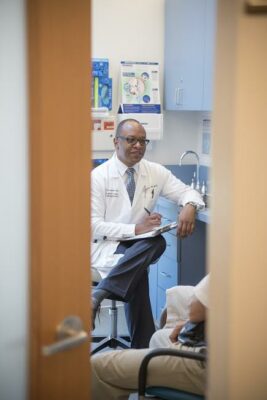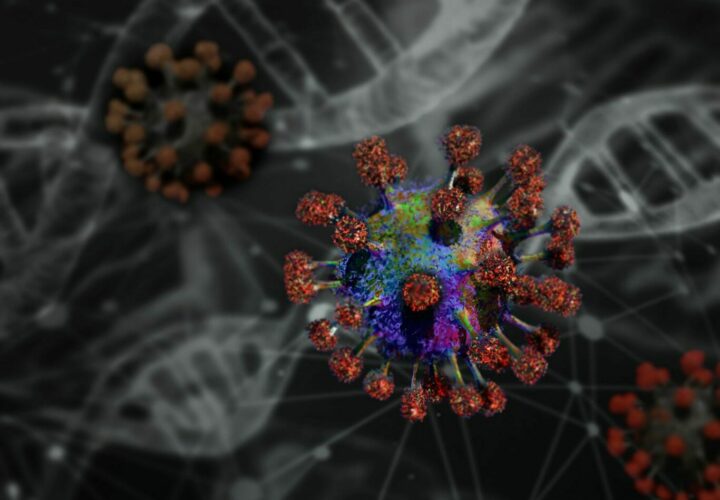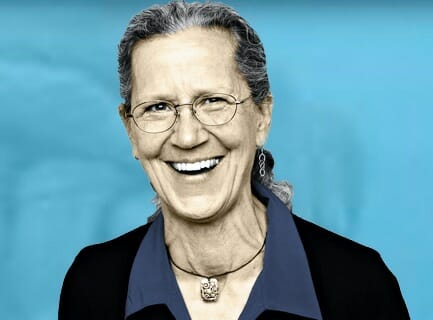As the number of people testing positive for COVID-19, or coronavirus, in the United States is rising, people with dementia and their loved ones fear that they could become infected.
Being Patient spoke with Dr. Dylan Wint, Director of Clinical Operations at Cleveland Clinic Lou Ruvo Center for Brain Health in Las Vegas, about how to recognize symptoms of COVID-19 in people with dementia and Alzheimer’s and what caretakers should do if they notice symptoms.
- Look out for early symptoms of coronavirus in patients with dementia: decline in cognitive conditions, changes appetite and thirst or any signs of a fever.
- Call your primary care doctor. If you don’t have access to one, call the urgent care or emergency care doctor.
- Caregivers must be involved and well-informed when a person with dementia is diagnosed with coronavirus.
Being Patient: We know that people with dementia are more vulnerable to contracting a virus like COVID-19. Explain to us why.
Dr. Dylan Wint: We don’t actually know exactly why. One of the obvious reasons is that dementia, the biggest risk factor is age and the biggest risk factor for having serious complications from COVID and other illnesses is age. So those two things combined in the individual with dementia puts them at a higher risk.
There are also abnormalities in immune systems of individuals with dementia. That’s been best studied in Alzheimer’s disease, but we see that in other dementias as well. And then there may be some things about the behavioral characteristics of dementia that lead to increased risks of either contracting or getting sick from an infectious illness.
So for example, we know that hygiene is one of the things that folks with dementia often struggle with. Also when they do get ill, they may have trouble expressing that they’re feeling different than they usually do. And all of these things can lead to getting sick faster and also if you do get sick—not getting treatment as early.
Being Patient: Can people with dementia who are older survive COVID-19?
Dr. Dylan Wint: Almost certainly folks will be able to recover. I can’t say that I’ve heard of a specific case nor have I heard of a specific case where someone had dementia and died. But I’m sure that there will be lots of people with dementia who recover from this.
Being Patient: One of the scariest things about this virus is that people can be asymptomatic. What’s the key to early detection in people with dementia who might not be able to articulate what’s wrong as well?
Dr. Dylan Wint: I should preface everything I say here with the fact that we know very little about this disease at this time, and we know even less about how it specifically affects people with Alzheimer’s disease.
But as with other novel situations, we try to learn from the past. So one thing is that with dementia, sometimes increased confusion or sudden decline in someone’s cognitive condition can signal a disease somewhere else in the body. This is classic with urinary tract infection or dehydration—that folks will become acutely more confused or have more trouble with their memory or change in behavior.
It is important to look for other features in illness in general—decrease in appetite, less thirst or more thirst. Anything that looks like a fever—so that can be sweating, breathing faster, reduced energy, reduced interactivity—those can all be symptoms of this or other conditions.
It is important to remember that because COVID-19 is a pandemic all over the world right now. Our folks with Alzheimer’s disease and other dementias aren’t protected from the things that have been affecting them all along. So be vigilant and look out for those too—unusual smell or color of the urine, coughing up sputum, things like that.
Being Patient: Should people risk taking their loved ones to a hospital?
Dr. Dylan Wint: I would say that first, there’s not a blanket statement that can be made about this. We have converted our visits to virtual visits as a baseline, but there is flexibility for patients that we need to see in order to assess their condition and those in whom their condition might pose a larger risk to them currently than COVID does.
So I would say the best way to find out why your doctor might want your mother to come in is to ask your doctor. And if the answer doesn’t seem suitable to you, ask whether you can put off that appointment for a couple of months.
Being Patient: If your loved ones are showing symptoms, is it safer just to keep them isolated at home than going straight to the ER?
Dr. Dylan Wint: This might be an unsatisfactory answer because again, I can’t give a blanket statement. But I think the first thing you want to do is call the primary care doctor. If you don’t have access to the primary care doctor, then call an urgent care or emergency services because, like you mentioned before, this can range from all the way from no symptoms to devastating symptoms. The people who really know about the course of COVID are the people who right now are our first responders, our emergency and urgent care providers and our primary care doctors.
There may be things that can be done at home to reduce the intensity of the disease without bringing someone to the emergency room and thus exposing them to other issues that we know can arise particularly for our loved ones with dementia. So I would say to start by calling a medical professional who’s familiar with that particular individual.
The next step if that doesn’t work out would be to call someone who’s familiar with COVID. Again that’s our ER urgent care doctors. Then finally if you cannot get answers, it’s probably best to get an evaluation in an urgent care or emergency room because it’s very difficult to pick up some of the things that might lead to real problems in the future. So someone may not look bad right now. For example, if their oxygenation level is low, that might be a signal that they’re going to get very sick from this condition that you wouldn’t be able to tell simply by looking.

Being Patient: If you were to receive someone at the Cleveland Clinic who was diagnosed with dementia and showing symptoms of coronavirus, would you do anything different with them in the terms of questions you ask or extra precaution?
Dr. Dylan Wint: Well I think as with other aspects of dementia and other co-morbidities of dementia, it’s very important that the caregiver is also involved in whatever treatment plan or whatever diagnosis methods are used because the caregiver is living with this also. Anything that affects someone with Alzheimer’s disease or dementia ends up affecting their caregiver so I think that’s one key thing—that the caregiver needs to be onboard and well-informed.
Some of the advice we give about medical conditions in folks with dementia include making sure to keep someone oriented frequently, making sure to let them know that you are there because they will feel somewhat uncomfortable. They will feel different from how they usually feel and they may not remember why that is.
You or I get a cold and we wake up and our nose is stuffed and we say, “Oh that’s right, I have a cold.” The person with dementia may wake up with a stuffy nose and it’s brand new information to them and keeping in close contact with whoever’s taking care of the dementia—neurologist, psychiatrist or primary care doctor—as well as whoever’s taking care of primary medical problems.
Also, look out for new dementia symptoms that might develop. Again, cognitive decline is really common when people get sick with other things.
So you have to think about all those things that you thought might happen a year from now—in the course of this illness, they may happen now. So that means you need to keep a closer eye on what they’re doing with their medications. You may need to help them out with their hygiene. They may temporarily become incontinent or have trouble with walking imbalance that they didn’t have before. So there needs to be additional vigilance to those neurological symptoms as well.
Getting ill with anything compromises brain function. You get sick, I get sick with the flu—we might be a little bit more confused, slower to think, tougher to remember, tougher to stay alert. Well, if you put that on top of a compromised brain, then it really magnifies the situation so you may see neurological symptoms that you haven’t seen before in this individual come out simply because their brain is under stress from the virus.
Being Patient: We get more terrified with each passing day because we read about how unprepared a lot of hospital systems around the world are for the coronavirus. Tell us about how the Cleveland Clinic is preparing for COVID-19?
Dr. Dylan Wint: Well, one of the things that we did very early on was start to gather equipment and increase our ability to test people for COVID-19. We also have re-deployed a lot of our workforce all the way from the physicians and surgeons to the people who do the maintenance to make sure that we can handle what’s going on.
We also—for ourselves—are checking people’s temperatures when they arrive so we can get early warning if anyone might be getting sick and reduce the risk they’ll spread it to other folks. We also got our hands on a lot of test kits to test the folks we take care of—first of all—to tell them whether they have COVID so that we can reduce the spread.
Being Patient: Do you have restrictions on who you will test and who can’t be tested?
Dr. Dylan Wint: We are following the CDC guidelines in regards to testing because test kits overall—even though we are getting them gathered—are still in relatively short supply when you compare it to the population. So we prioritize individuals who are at higher risk. So those are older folks.
We prioritize people who have symptoms or have clear exposures to someone who is positive. So even though there are restrictions, we’re still able to test that segment of the population which we actually weren’t able to do when this crisis first started.
Cleveland Clinic does have an online screening tool to tell you whether it’s likely that you’ve been infected with the novel coronavirus.
At Cleveland Clinic in Ohio, they do have testing but you can’t just walk up and get tested. You have to be evaluated by a physician who will then refer you for testing. And you wait to get called to come in for your testing appointment because even though people need to be tested, we also still need to get them away from each other.
The last thing you want is people to be in a long line waiting to be tested—two of the five people are infected and they pass it along to the other 3 people in line, who if they go and get tested at that moment will test negative. Then they will go and spread the virus. So we have to control the means of testing also. I know that’s very very frustrating and disappointing to hear for a lot of people but it’s another way in which we have to operate to keep the virus from spreading.
Being Patient: Should hospitals allow caregivers to come in and visit their loved ones with dementia who are hospitalized with COVID?
Dr. Dylan Wint: I do not want to speak specifically for a hospital or a given circumstance. However, I would be inclined to think that hospitals would restrict that kind of visitation and that they would want you to lean more towards visiting by phone or by video connecting as opposed to being in bodily contact or being with someone with COVID-19.
It’s funny—as I hear this coming out of my mouth—it sounds so strange to me because I routinely tell people when their loved ones with dementia is hospitalized that they need to be in the hospital as much as they can.
But in this case, it is more important to stay away and not spread the virus because remember for most caregivers, if they get sick, if they go down, the person with dementia does not have much in the way of other resources. So they have to stay well themselves.
One of the things we’re trying to stress is the importance of planning. It’s not just for if you get sick but if you have to tend to someone who got sick or you have to do something as a result of this virus. There are so many things we are doing or not doing that three months ago, we never would have conceived of.
So having a plan for respite—whether it’s having a relative come and help out, having a friend help, some extended care facilities offer respite terms of care for a few days or a few weeks so you really want to make a respite plan not because—god forbid—any of you get the virus. But it’s a good thing to have in any circumstances.
Being Patient: What’s your biggest concern right now?
Dr. Dylan Wint: I’m at a Cleveland Clinic location in Las Vegas and we haven’t seen a lot of cases. In Cleveland Clinic in Ohio, we have seen a substantial number of cases. But part of the reason we haven’t seen a lot in Las Vegas I suspect is because we didn’t get as many testing kits as early as Ohio did. But we’re going to see those numbers increase. I know for sure that Nevada has not reached its peak. Ohio does not seem to have reached its peak either.
My biggest worry is that there will be some caregivers who get sick before they’re able to tell someone that they’re sick and that the one that they care for—the individual with dementia will be stuck without a way to get the help. I think that’s the biggest concern for my patients.




